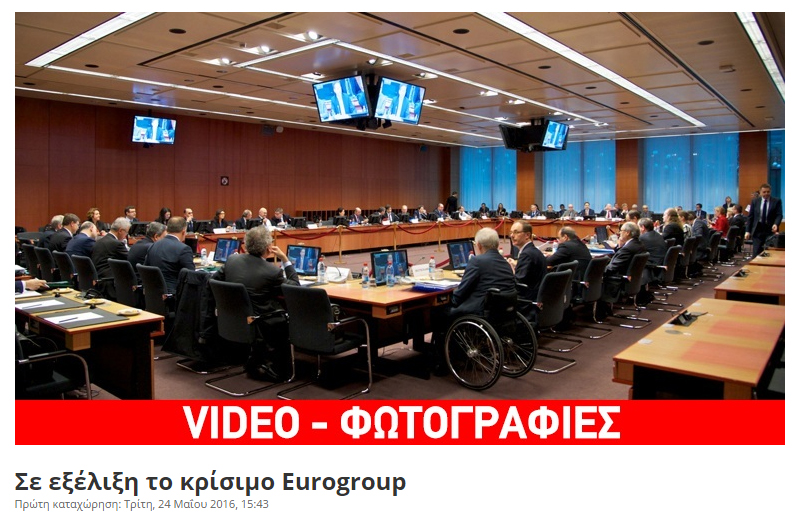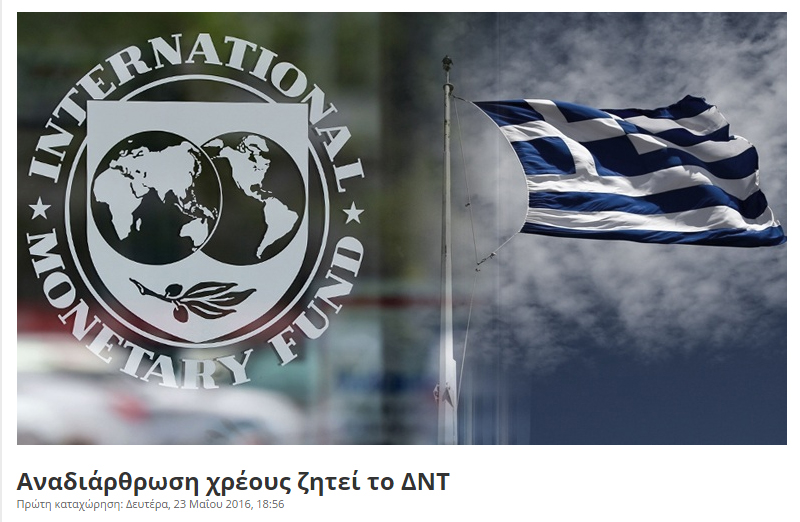Έπειτα από δώδεκα ώρες διαπραγματεύσεων βγήκε λευκός καπνός από την αίθουσα συνεδριάσεων του Eurogroup, με συμφωνία για την αξιολόγηση που συνοδεύτηκε από την έγκριση τμηματικής εκταμίευσης της δόσης των 10,3 δισ. ευρώ και σταδιακή συζήτηση για την διευθέτηση του χρέους. Με το ΔΝΤ να κοντράρεται ανοικτά με την Γερμανία και τελικά να παραμένει στο πρόγραμμα διάσωσης, η Ελλάδα τίθεται σε καθεστώς εποπτείας έως και το 2018 οπότε και θα διευθετηθούν οι τελικές λεπτομέρειες για τον μόνιμο βραχνά της ελληνικής οικονομίας.
Μάλιστα, όπως ενημέρωσε ο Πρόεδρος του Eurogroup, Jeroen Disjellbloem στη συνέντευξη Τύπου που ακολούθησε, μετά τη συμφωνία το Διεθνές Νομισματικό Ταμείο εξέφρασε την πρόθεσή του να προτείνει στο διοικητικό του συμβούλιο πριν τα τέλη του έτους τη συμμετοχή του στο ελληνικό πρόγραμμα.
Θα προηγηθούν δύο βήματα: μια νέα ανάλυση βιωσιμότητας του χρέους και η αξιολόγηση των μέτρων για το χρέος που αποφασίστηκαν σήμερα. Σημειώνεται ότι παρών στη συνέντευξη Τύπου ήταν για πρώτη φορά ο Poul Thomsen.
Το Eurogroup διατηρεί το στόχο για πρωτογενές πλεόνασμα 3,5% του ΑΕΠ έως το 2018. Βραχυπρόθεσμα, το Eurogroup συμφώνησε σε μία πρώτη δέσμη μέτρων που θα εφαρμοστεί μετά την ολοκλήρωση της πρώτης αξιολόγησης και έως τα τέλη του προγράμματος και θα περιλαμβάνει:
-πιο ήπιο προφίλ αποπληρωμής των δανείων του EFSF με βάση την τρέχουσα μέση, σταθμισμένη ωρίμανση
-χρήση της διαφοροποιημένης στρατηγικής του EFSF/ESM για τη μείωση του επιτοκιακού κινδύνου
Μεσοπρόθεσμα θα εφαρμοστεί πιθανό δεύτερο σετ μέτρων, δεδομένης της επιτυχούς ολοκλήρωσης του προγράμματος το 2018. Αυτά θα πριλαμβάνουν, μεταξύ άλλων, την επιστροφή στην Ελλάδα των κερδών των κεντρικών τραπεζών της Ευρωζώνης από ελληνικά ομόλογα.
Μακροπρόθεσμα, θα εξεταστεί η ενεργοποίηση ενός μηχανισμού εάν κριθεί πως απαιτούνται επιπλέον μέτρα χρέους για να μην παραβιαστεί το όριο των μικτών χρηματοδοτικών αναγκών.
Επί της ουσίας, κατόπιν και των σκληρών μέτρων που ενεκρίθησαν από την ελληνική Βουλή την περασμένη Κυριακή, άνοιξε ο δρόμος για την εκταμίευση των δόσεων, ωστόσο η επιφυλακτικότητα των δανειστών παραμένει με αποτέλεσμα να δώσουν προς ώρας την υπόσχεση για… μακροπρόθεσμη συζήτηση σε ό,τι αφορά το χρέος, με ορίζοντα τον Ιούνιο του 2018.
Η συνέντευξη Τύπου μετά το Eurogroup
Οι δηλώσεις του Ευκλείδη Τσακαλώτου
H δήλωση του Σόιμπλε
H τοποθέτηση του υπουργείου οικονομικών
Στο Eurogroup υπήρξαν σημαντικές αποφάσεις, αναφέρουν πηγές του ΥΠΟΙΚ:
1. Η αξιολόγηση ολοκληρώθηκε και θα υπάρξει εκταμίευση συνολικού ύψους 10,3 δισ. ευρώ σε δύο τμήματα. Τα 7,5 δισ. τον Ιούνιο και τα υπόλοιπα 2,8 δισ. ευρώ τον Σεπτέμβριο.
2. Ουσιαστικά δίνονται για τα ληξιπρόθεσμα χρέη του δημοσίου 3,5 δισ. ευρώ, περίπου 700.000 ευρώ το μήνα μέχρι και τον Οκτώβριο του 2016. Δηλαδή 5 μήνες Χ 700.000=3,5 δισ. ευρώ θα “πέσουν” στην αγορά.
3. Συμφωνήθηκε ότι η Ελλάδα δεν θα πληρώνει πάνω από το 15% για τόκους και χρεολύσια [GDP] το μεσοπρόθεσμο χρονικό διάστημα. Στη συνέχεια ο περιορισμός αυξάνεται στο 20% του GDP. Το ποσοστό αυτό, στο οποίο θα περιλαμβάνονται και τα έντοκα γραμμάτια, είναι χαμηλό με βάση όλους τους συγκριτικούς δείκτες για χώρες με ανάλογα οικονομικά χαρακτηριστικά. Και μειώνει αποφασιστικά τις χρηματοδοτικές ανάγκες της χώρας για τα επόμενα χρόνια.
4. Ρυθμίζεται άμεσα, από αύριο, το θέμα του χρέους.
– Τα συγκεκριμένα μέτρα [βραχυπρόθεσμα, μεσοπρόθεσμα και μακροπρόθεσμα] για την ρύθμιση του χρέους δημιουργούν ένα σαφή οδικό χάρτη που εξομαλύνει τις συνθήκες ρευστότητας στην οικονομία.
– Είκοσι δισ. ευρώ που περίσσεψαν από την ανακεφαλαιοποίηση των τραπεζών χαρακτηρίζονται ως “διαθέσιμα” για πράξεις επαναγοράς του χρέους.
– Οι συμφωνηθείσες παρεμβάσεις για το χρέος επιτυγχάνουν την έξοδο στις αγορές, μέσω της τόνωσης της επενδυτικής εμπιστοσύνης και της εξάλειψης των συνθηκών αβεβαιότητας στην οικονομία.
– Η συμφωνία εξασφάλισης της βιωσιμότητας του χρέους είναι προσαρμοσμένη στα ιδιαίτερα χαρακτηριστικά της ελληνικής οικονομίας. Και εξασφαλίζει, για μακρύ χρονικό διάστημα, την χρηματοδότηση της οικονομίας, υπό πολύ ευνοϊκούς όρους.
H επίσημη ανακοίνωση του Eurogroup
«The Eurogroup welcomes that a full staff-level agreement has been reached between Greece and the institutions. Also, the Eurogroup notes with satisfaction that the Greek authorities and the European institutions have reached an agreement on the contingency fiscal mechanism, which is in line with the Eurogroup statement adopted on 9 May in particular as regard the possible adoption of permanent structural measures, including revenue measures, to be agreed with the institutions. It therefore provides further reassurances that Greece will meet the primary surplus targets of the ESM programme (3.5% of GDP in the medium-term), without prejudice to the obligations of Greece under the SGP and the Fiscal Compact.
The Eurogroup also welcomes the adoption by the Greek parliament of most of the agreed prior actions for the first review, notably the adoption of legislation to deliver fiscal parametric measures amounting to 3% of GDP that should allow to meet the fiscal targets in 2018, to open up the market for the sale of loans and to establish the agreed Greek Privatisation and Investment Fund that should operate in full independence. The Eurogroup mandates the EWG to verify in the next few days the full implementation of the outstanding prior actions on the basis of an assessment by the institutions, in particular the corrections to the legislation on the opening up of the market for the sale of loans, and on the pension reform, as well as the completion of all prior actions related to the government pending actions in the field of privatization.
Following the full implementation of all prior actions and subject to the completion of national procedures, the ESM governing bodies are expected to endorse the supplemental MoU and approve the disbursement of the second tranche of the ESM programme. The second tranche under the ESM programme amounting to EUR 10.3 bn will be disbursed to Greece in several disbursements, starting with a first disbursement in June (EUR 7.5 bn) to cover debt servicing needs and to allow a clearance of an initial part of arrears as a means to support the real economy. The subsequent disbursements to be used for arrears clearance and further debt servicing needs will be made after the summer. The disbursements for arrears clearance will be subject to a positive reporting by the European Institutions on the clearance of net arrears. The additional disbursement for debt servicing needs will be subject to milestones related to privatization, including the new Privatization and Investment Fund, bank governance, revenue agency and energy sector to be assessed by the European institutions and verified by the EWG and the ESM Board of Directors.
In line with the 9 May Eurogroup statement, and in view of the forthcoming full implementation of all the prior actions by Greece and completion of the first review, the Eurogroup considered today the sustainability of Greek public debt.
The Eurogroup agrees to assess debt sustainability with reference to the following benchmark for gross financing needs (GFN): under the baseline scenario, GFN should remain below 15% of GDP during the post programme period for the medium term, and below 20% of GDP thereafter.
The Eurogroup recalls the medium-term primary surplus target of 3.5% of GDP as of 2018 and underlines the importance of a fiscal trajectory consistent with the fiscal commitments under the EU framework.
The Eurogroup recalls the following general guiding principles agreed on 9 May for possible additional debt measures: (i) facilitating market access in order to replace over time public financed debt with privately financed debt; (ii) smoothening the repayment profile; (iii) incentivising the country’s adjustment process even after the programme ends; and (iv) flexibility to accommodate uncertain GDP growth and interest rate developments in the future. On 9 May the Eurogroup also reconfirmed that nominal haircuts are excluded, and that all measures taken will be in line with existing EU law and the ESM and EFSF legal frameworks.
Guided by these principles and on the basis of technical work carried out by the EWG, the Eurogroup agreed today on a package of debt measures which will be phased in progressively, as necessary to meet the agreed benchmark on gross financing needs and will be subject to the pre-defined conditionality of the ESM programme.
For the short-term, the Eurogroup agrees on a first set of measures which will be implemented after the closure of the first review up to the end of the programme and which includes:
Smoothening the EFSF repayment profile under the current weighted average maturity
Use EFSF/ESM diversified funding strategy to reduce interest rate risk without incurring any additional costs for former programme countries
Waiver of the step-up interest rate margin related to the debt buy-back tranche of the 2nd Greek programme for the year 2017
The Eurogroup asks the EFSF and ESM management to take these measures forward within their mandate, on the basis of preparatory work by the EWG, and where needed to prepare formal decision making by the relevant EFSF and ESM decision-making bodies. The decision on the smoothening of the EFSF repayment profile and the reduction of interest rate risks should be taken as a matter of priority.
For the medium term, the Eurogroup expects to implement a possible second set of measures following the successful implementation of the ESM programme. These measures will be implemented if an update of the debt sustainability analysis produced by the institutions at the end of the programme shows they are needed to meet the agreed GFN benchmark, subject to a positive assessment from the institutions and the Eurogroup on programme implementation.
Abolish the step-up interest rate margin related to the debt buy-back tranche of the 2nd Greek programme as of 2018
Use of 2014 SMP profits from the ESM segregated account and the restoration of the transfer of ANFA and SMP profits to Greece (as of budget year 2017) to the ESM segregated account as an ESM internal buffer to reduce future gross financing needs.
Liability management – early partial repayment of existing official loans to Greece by utilizing unused resources within the ESM programme to reduce interest rate costs and to extend maturities.
If necessary, some targeted EFSF reprofiling (e.g. extension of the weighted average maturities, re-profiling of the EFSF amortization as well as capping and deferral of interest payments) to the extent needed to keep GFN under the agreed benchmark in order to give comfort to the IMF and without incurring any additional costs for former programme countries or to the EFSF.
For the long-term, the Eurogroup is confident that the implementation of this agreement on the main features for debt measures, together with a successful implementation of the Greek ESM programme and the fulfilment of the primary surplus targets as mentioned above, will bring Greece’s public debt back on a sustainable path over the medium to long run and will facilitate a gradual return to market financing. At the same time, the Eurogroup agrees on a contingency mechanism on debt which would be activated after the ESM programme to ensure debt sustainability in the long run in case a more adverse scenario were to materialize. The Eurogroup would consider the activation of the mechanism provided additional debt measures are needed to meet the GFN benchmark defined above and would be subject to a decision by the Eurogroup confirming that Greece complies with the requirements under the SGP. Such mechanism could entail measures such as a further EFSF reprofiling and capping and deferral of interest payments. Also, the Eurogroup commits to long-term technical assistance to boost Greek growth.
The Eurogroup recognises that over the exceptionally long time horizon of assessing debt sustainability there can be no forecasts, only assumptions, given the sizable degree of uncertainty over macroeconomic developments.
Against the background of the forthcoming successful completion of the first review and the agreement on debt relief, the Eurogroup welcomes the intention of the IMF management to recommend to the Fund’s Executive Board to approve a financial arrangement before the end of 2016 that will support the implementation of the agreed fiscal and structural reforms. It is recognised that, consistent with IMF policies, approval of this arrangement will also be based on a new DSA and the assessment of possible debt relief measures mentioned above. The possible debt relief will be delivered at the end of the programme in mid-2018 and the scope will be determined by the Eurogroup on the basis of a revised DSA in cooperation with the European Institutions for purposes of taking into account the European policy framework, subject to full implementation of the programme.
The Eurogroup stands ready, in line with usual practice, to support the completion of future reviews provided that the policy package considered today, including the contingency mechanism, is implemented as planned. The Eurogroup confirms that programme implementation, as well as policy conditionality and targets, will be reviewed regularly based on input from the institutions.



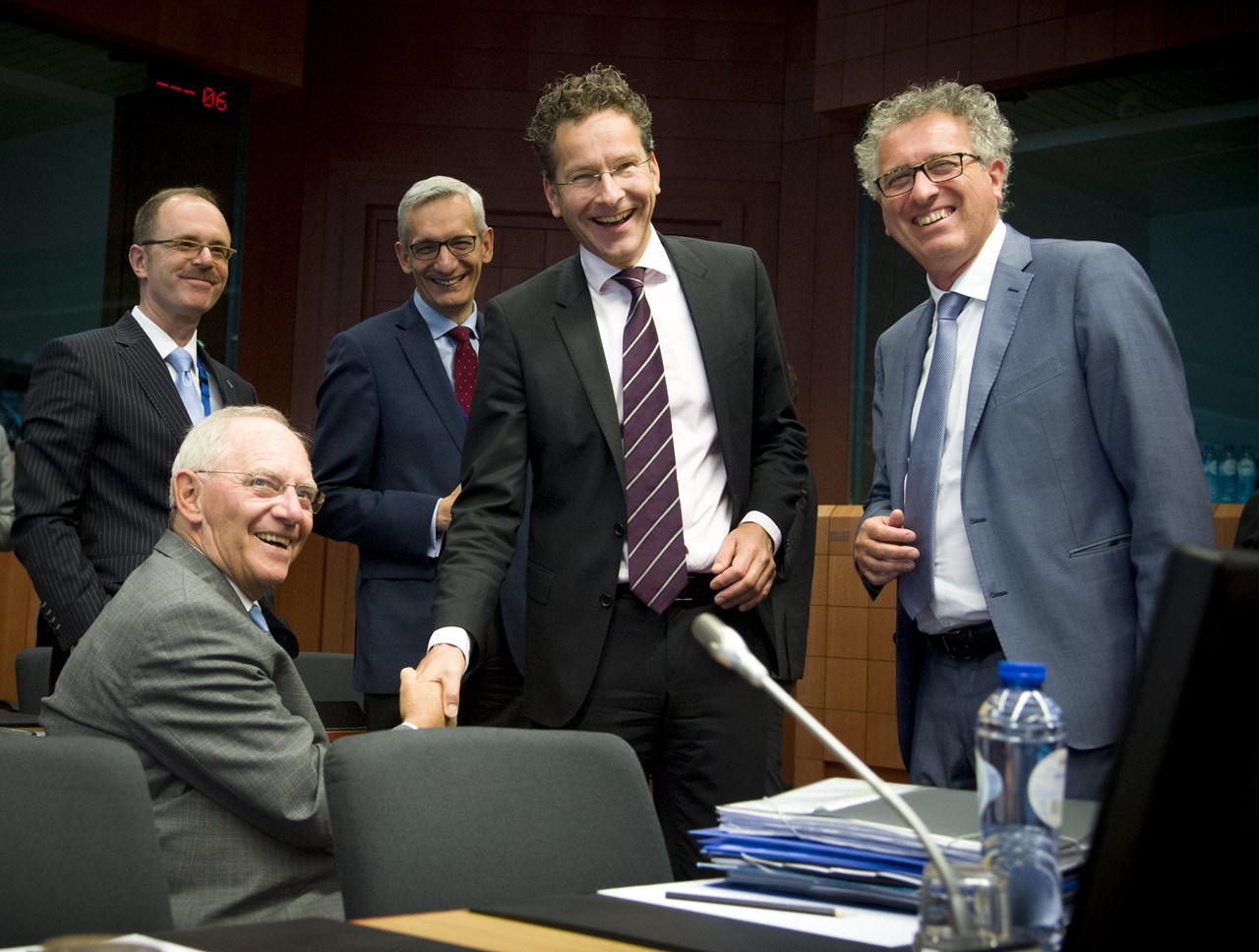
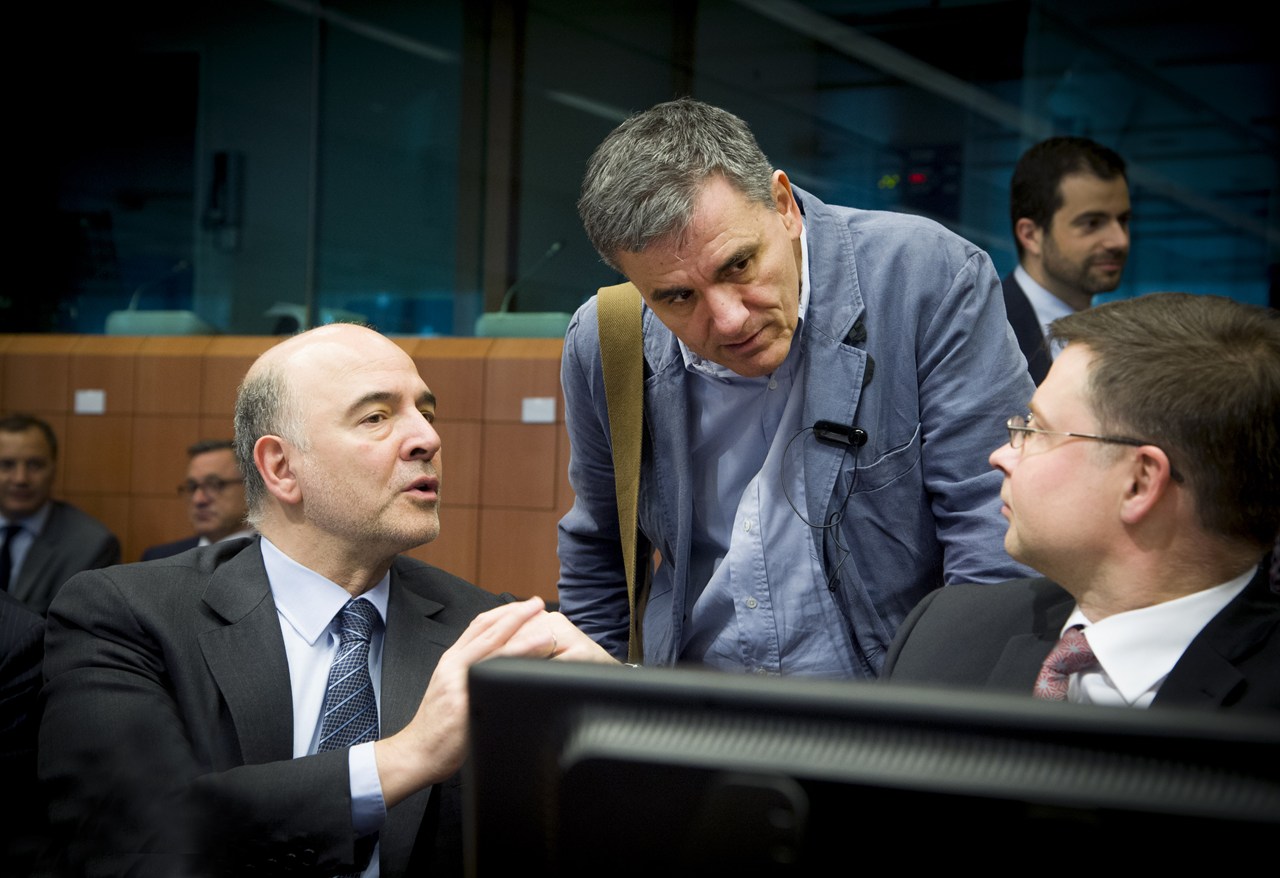


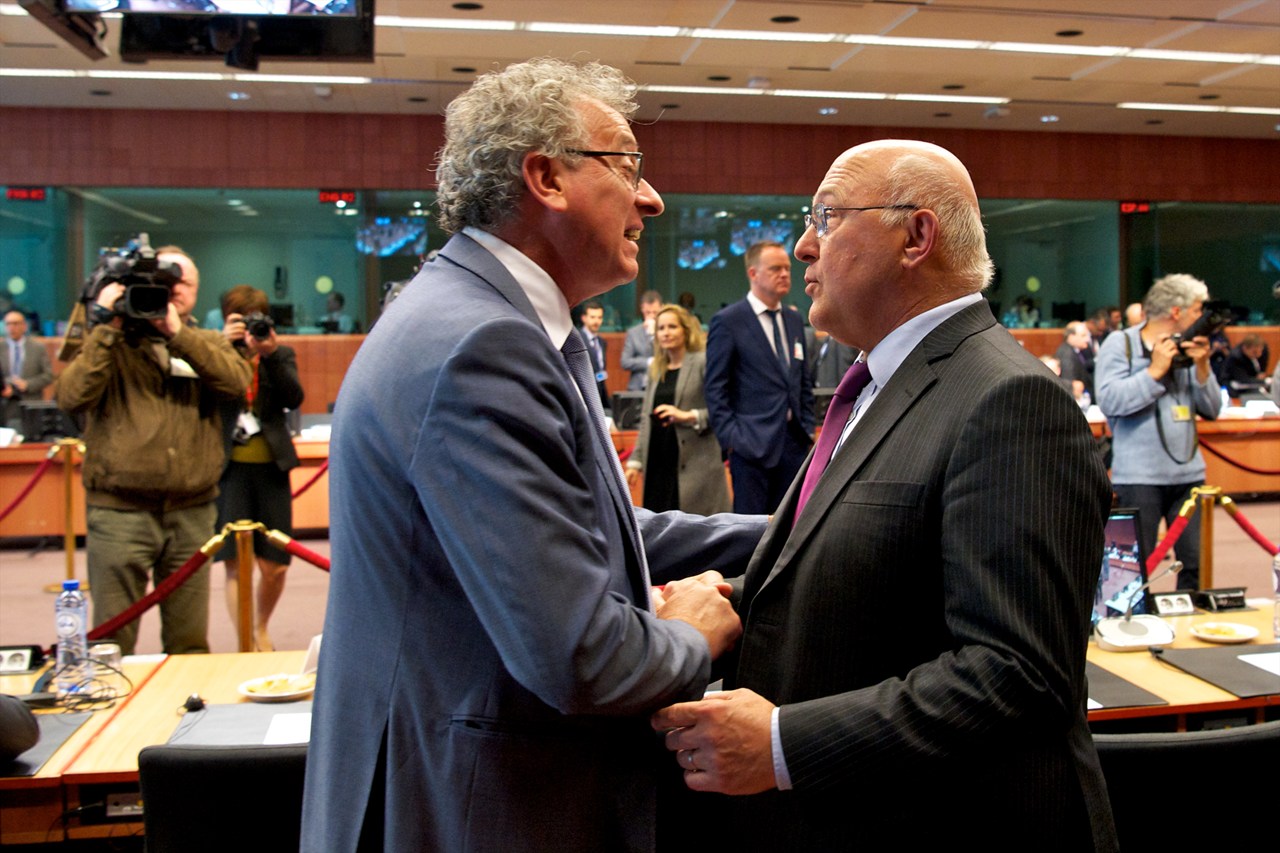
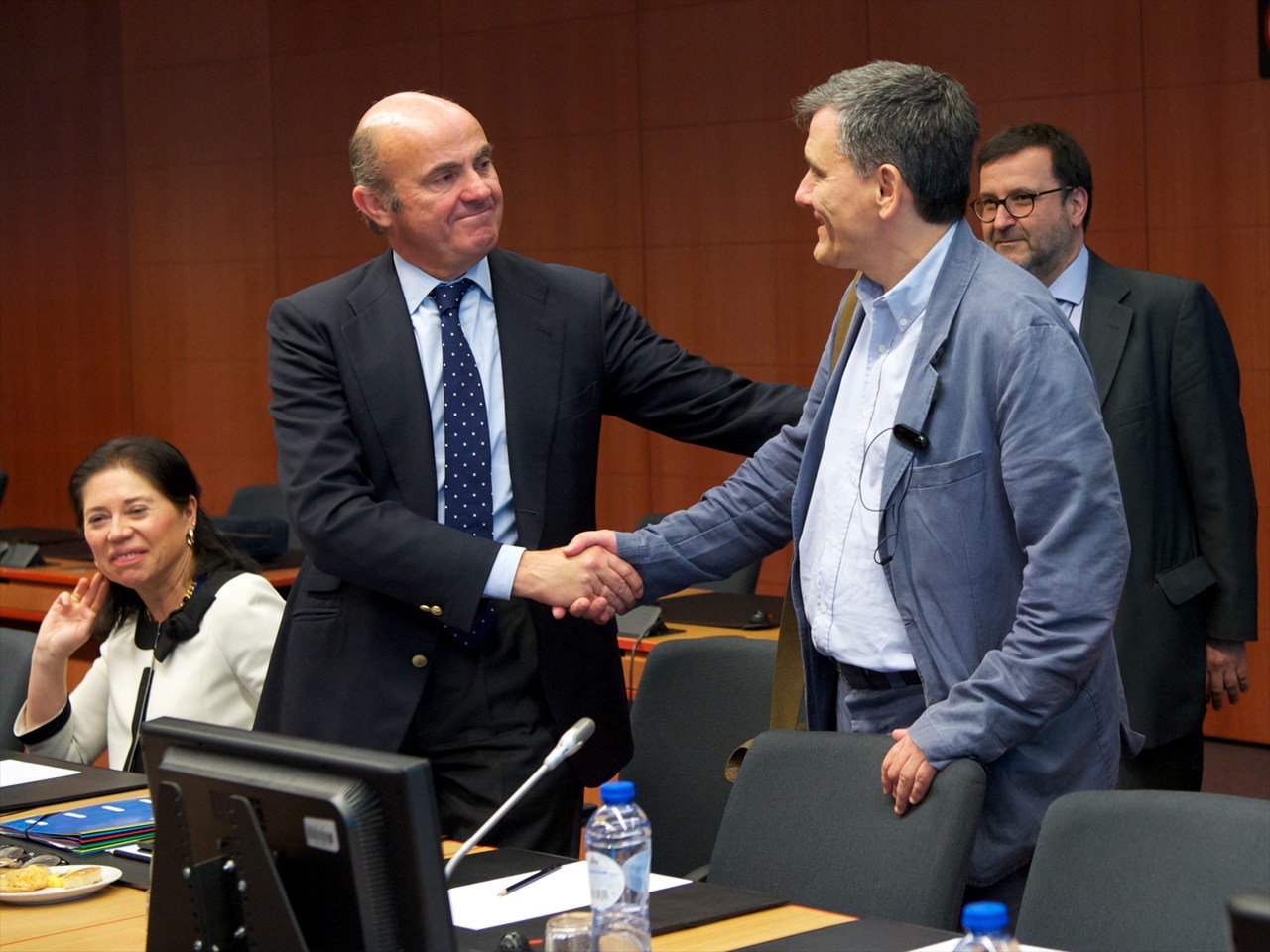
Φωτογραφίες: Eurokinissi
Διαβάστε επίσης:


